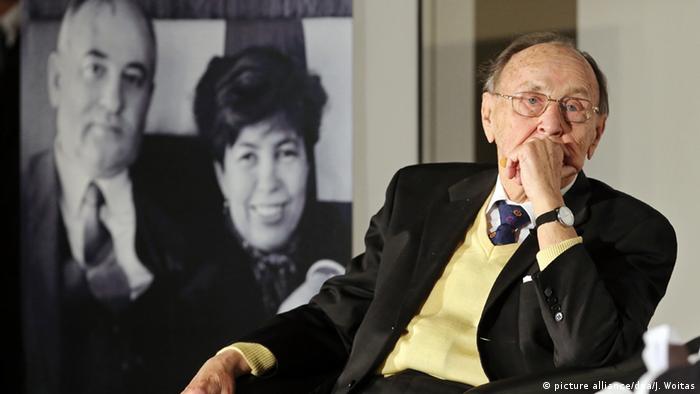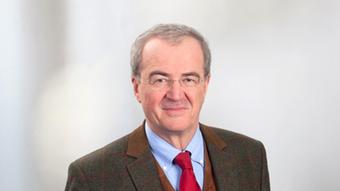Germany
Comment: The Virtuoso of the compensation
Hans-Dietrich Genscher’s political legacy remains the obligation to today. And yet encounter in the 21st century. Century its guidelines to the limits, says the editor-in-chief of Deutsche Welle, Alexander Kudascheff.

Hans-Dietrich Genscher in front of a photo of the last Soviet leader Mikhail Gorbachev and his wife Raisa
Hans Dietrich Genscher, the one born was not a foreign politician. But he has been in around 18 years, the German foreign Minister par excellence. He was, he lived, he embodied the foreign policy of the Federal Republic of Germany. They sought compensation – permanent compensation with the partners in Europe, with the United States – but also with the Eastern neighbors, who were enemies, and the Soviet super-power. This constant Search for compromise, after Compromise, often the way was the goal, was Genscher’s foreign-policy Theme.
It is the root of the German post-war policy. A root that is not liked by the way many in the United States. There you saw in this art of balancing a foreign policy of Approximate, Vague, non-committal. Some of the counterpart beyond the Atlantic held Genscher for an unreliable “compagnon de route”. The Washes, which he mastered amazing and fabulous, even over deep trenches of enmity, they held for a foreign policy without direction.
Model up today
Genscher’s foreign policy has become the model of the German, United German foreign policy. German foreign policy is, today, in Berlin, in Bonn, to tolerate as much as possible to all or to at least talk about it reasonably. Such a foreign policy is based on the European community and it is deep, often critical, rooted in the Western Alliance policy. She’s looking for but always a compromise, a balancing – least, and by way of example only with Moscow in the Ukraine crisis. The thread of the conversation is not to tear down, to hold many diplomatic balls in the air: This particular virtuosity Genscher, the mission statement is also his successors – until today. Whether Kinkel, Fischer, Guido Westerwelle or Steinmeier – all sought and seek with the means of the diplomacy, conflict, or war to disarm it.

DW editor-in-chief Alexander Kudascheff
German foreign policy is therefore also always – regardless of the use in the Balkans or in Afghanistan – a diplomacy of military restraint. War is in the eyes of the German chief diplomats not only the last Alternative, it is actually no Alternative. German foreign policy, which has marked Hans Dietrich Genscher, he expresses his stamp on, is diplomacy without weapons, without military. The German foreign policy relies instead on “soft skills”, that is, on Persuasion instead of guns. This is of course an experience of the Second world war, but she also has more than 70 years after the end of foreign policy.
The time of restraint is over
The German, when asked questions, see themselves as the “green Switzerland”: a cozy booth nestled in your well, busy and as far away from the world. But this is only an Illusion. Germany makes a veritable means of, in Europe, even a large. In the Euro crisis, but also in the refugee crisis, the Europeans looked to the part in wonder at the new, self-conscious German. A German government that dictates to its partners, terms and conditions and not pursuing the harmonious consensus of all the – mostly German.
Since it is clear that Genscher’s foreign policy, not overestimated as rational as reasonable influence, in the century of globalization to its limits. Of course, Germany is not self-glorious and unreasonable suddenly to the military component – but it is more likely to be in demand than ever. The time of restraint is over. German foreign policy is still on the intellectual shoulders of Hans-Dietrich Genscher, will have to adjust.
You can leave below this article, leave a comment. We look forward to your expression!